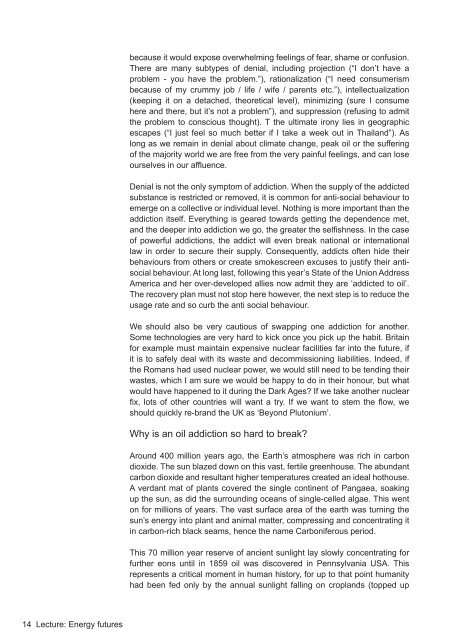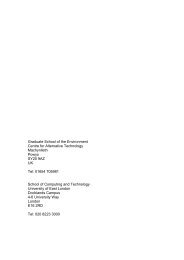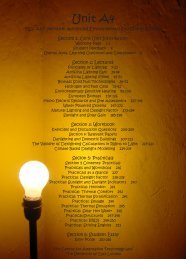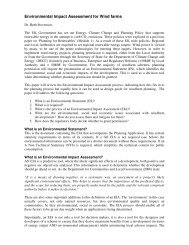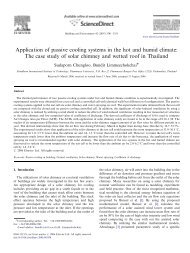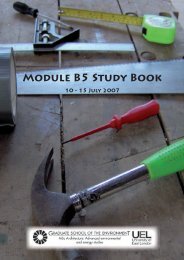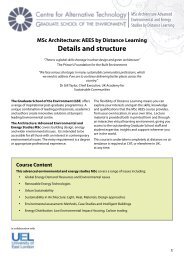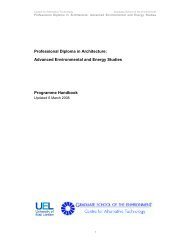Module B1 Study Book - the Graduate School of the Environment
Module B1 Study Book - the Graduate School of the Environment
Module B1 Study Book - the Graduate School of the Environment
Create successful ePaper yourself
Turn your PDF publications into a flip-book with our unique Google optimized e-Paper software.
ecause it would expose overwhelming feelings <strong>of</strong> fear, shame or confusion.<br />
There are many subtypes <strong>of</strong> denial, including projection (“I don’t have a<br />
problem - you have <strong>the</strong> problem.”), rationalization (“I need consumerism<br />
because <strong>of</strong> my crummy job / life / wife / parents etc.”), intellectualization<br />
(keeping it on a detached, <strong>the</strong>oretical level), minimizing (sure I consume<br />
here and <strong>the</strong>re, but it’s not a problem”), and suppression (refusing to admit<br />
<strong>the</strong> problem to conscious thought). T <strong>the</strong> ultimate irony lies in geographic<br />
escapes (“I just feel so much better if I take a week out in Thailand”). As<br />
long as we remain in denial about climate change, peak oil or <strong>the</strong> suffering<br />
<strong>of</strong> <strong>the</strong> majority world we are free from <strong>the</strong> very painful feelings, and can lose<br />
ourselves in our affluence.<br />
Denial is not <strong>the</strong> only symptom <strong>of</strong> addiction. When <strong>the</strong> supply <strong>of</strong> <strong>the</strong> addicted<br />
substance is restricted or removed, it is common for anti-social behaviour to<br />
emerge on a collective or individual level. Nothing is more important than <strong>the</strong><br />
addiction itself. Everything is geared towards getting <strong>the</strong> dependence met,<br />
and <strong>the</strong> deeper into addiction we go, <strong>the</strong> greater <strong>the</strong> selfishness. In <strong>the</strong> case<br />
<strong>of</strong> powerful addictions, <strong>the</strong> addict will even break national or international<br />
law in order to secure <strong>the</strong>ir supply. Consequently, addicts <strong>of</strong>ten hide <strong>the</strong>ir<br />
behaviours from o<strong>the</strong>rs or create smokescreen excuses to justify <strong>the</strong>ir antisocial<br />
behaviour. At long last, following this year’s State <strong>of</strong> <strong>the</strong> Union Address<br />
America and her over-developed allies now admit <strong>the</strong>y are ‘addicted to oil’.<br />
The recovery plan must not stop here however, <strong>the</strong> next step is to reduce <strong>the</strong><br />
usage rate and so curb <strong>the</strong> anti social behaviour.<br />
We should also be very cautious <strong>of</strong> swapping one addiction for ano<strong>the</strong>r.<br />
Some technologies are very hard to kick once you pick up <strong>the</strong> habit. Britain<br />
for example must maintain expensive nuclear facilities far into <strong>the</strong> future, if<br />
it is to safely deal with its waste and decommissioning liabilities. Indeed, if<br />
<strong>the</strong> Romans had used nuclear power, we would still need to be tending <strong>the</strong>ir<br />
wastes, which I am sure we would be happy to do in <strong>the</strong>ir honour, but what<br />
would have happened to it during <strong>the</strong> Dark Ages? If we take ano<strong>the</strong>r nuclear<br />
fix, lots <strong>of</strong> o<strong>the</strong>r countries will want a try. If we want to stem <strong>the</strong> flow, we<br />
should quickly re-brand <strong>the</strong> UK as ‘Beyond Plutonium’.<br />
Why is an oil addiction so hard to break?<br />
Around 400 million years ago, <strong>the</strong> Earth’s atmosphere was rich in carbon<br />
dioxide. The sun blazed down on this vast, fertile greenhouse. The abundant<br />
carbon dioxide and resultant higher temperatures created an ideal hothouse.<br />
A verdant mat <strong>of</strong> plants covered <strong>the</strong> single continent <strong>of</strong> Pangaea, soaking<br />
up <strong>the</strong> sun, as did <strong>the</strong> surrounding oceans <strong>of</strong> single-celled algae. This went<br />
on for millions <strong>of</strong> years. The vast surface area <strong>of</strong> <strong>the</strong> earth was turning <strong>the</strong><br />
sun’s energy into plant and animal matter, compressing and concentrating it<br />
in carbon-rich black seams, hence <strong>the</strong> name Carboniferous period.<br />
This 70 million year reserve <strong>of</strong> ancient sunlight lay slowly concentrating for<br />
fur<strong>the</strong>r eons until in 1859 oil was discovered in Pennsylvania USA. This<br />
represents a critical moment in human history, for up to that point humanity<br />
had been fed only by <strong>the</strong> annual sunlight falling on croplands (topped up<br />
14 Lecture: Energy futures


